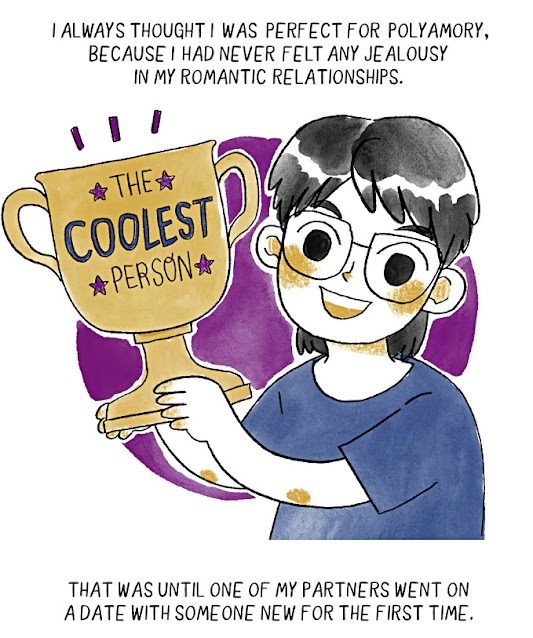"Raising Kids in a Big, Happy, Poly Family." Hulu's "Conversations with Friends." "No-Nonsense Non-Monogamy." And more. PS: Fascism.
The unique normalness of families with three or more parents
By Nayanika Guha...Turns out, these arrangements aren’t particularly rare, and in the day-to-day, polyamorous families are simply… families.Journie, 40, grew up in a polyamorous household in northern Michigan.... “I always had a big family and people there for me for every step in life. Even though, technically, all my siblings are half siblings or not biologically related at all, we’ve never thought of ourselves as anything less than siblings,” [Journie] said. “And even after I lost both of my biological parents as a young adult, I still had my Momma Jeanne and my Terri as parental figures in my life.” ... Today, Journie is supporting their [own] polyamorous partners in raising their own children, too....While parental roles can be well-defined, often, parents in polyamorous relationships adjust to meet the fluctuating needs of an extended poly family at different points. Journie, who helps raise their polyamorous partner’s child, says that they have stepped up to fill the role of a parent by staying at their house and getting them to and from school while their parents were unavailable, cooking meals, and taking them to doctors appointments, helping them learn to drive or providing emotional support during tough times....--------------------------------Sunny Singh, Speetie Singh and Piddu Kaur, a polyamorous family from Indiana who are raising four children together, approach parental responsibilities more fluidly. “I think we never made any rules. Each of us handles whatever we like to do,” says Speeti. “We are kind of winging it as we go. We are all mom and dad to all the kids,” adds Sunny.It helps that the three often tend to be on the same page about how they want to raise the children and are pretty like-minded. But differences arise at times. “The kids enjoy that,” says Sunny. “If one of us says no to something, they get to try two more times.” However, the adults often work together to find common ground.Stephanie M. Sullivan, a licensed marriage and family therapist who works primarily with LGBTQ+ individuals and polyamorous folks, emphasizes the need for good communication in resolving conflict but also in just understanding the role each parent plays. ... Having very honest conversations about what roles each partner has in the children’s lives is essential.If two people are nesting partners, and they each have external relationships, it needs to be clear how involved external partners will be in the children’s lives ... Ultimately, relationship experts say, the impact of a polyamorous relationship on children is directly related to people’s parenting rather than their polyamorous status. ...--------------------------------...For the children in the house, having multiple people to rely on who can model healthy relationships can be a big benefit. And for Speeti, Sunny, and Piddu’s four children, having two mothers and a father is the most normal thing in the world. “Our kids have managed to handle it well, and they actually brag about it. The oldest one, she reframes the whole thing and makes it so that it’s something to be proud of. She’s got a great handle on this,” says Sunny.“I think what they mostly met up with was a lot of curiosity. A little bit from the other kids, but the other kids would normalize it pretty quick. It would be more from other parents who would be curious and ask their kids to find out for them.”... Their children have accepted their family as normal, and this is the only way that the younger ones have known things to be....Polyamorous partnerships can also help children understand the value of family. Journie has always had a big family, and people who were there for them every step of the way. ...
A group supporting those who practice polyamory and other forms of “ethical non-monogamy” want more relationship-status options on Facebook.By Valeriya Safronova...Despite the growing normalization of non-monogamy as a practice, Mr. Chamberlin said, many people who engage in it still fear being public about their lifestyles.“You could be fired from your job, denied housing or lose a custody battle based on the structure of your intimate relationships,” he said. The goal of his organization, which he and two others founded in April, is to raise awareness and create more acceptance of non-monogamous relationships.“Over the long run, one of the projects of culture and society is giving people more space to be in the consensual relationships they choose,” he said. He pointed to the movement for L.G.B.T.Q. rights as one of those projects. Consensual non-monogamy, he added, “is the next chapter.” ...
When people choose ethical non-monogamy from a place of freedom, they are less anxious and depressed than if they are pressured into it....Sometimes, the "decision" to be non-monogamous is one that lacks autonomy. The authors found that when one partner feels pressured by the other to open their relationship, their mental health suffers. This often happens when one person agrees to go along or “take one for the team” out of fear of losing their partner. This typically produces anxiety and depression and leads to both partners resenting each other.Most people who successfully practice ethical non-monogamy emphasize that it best succeeds in the context of clear, ongoing communication and consent. It thrives when there are clearly articulated rules and boundaries. Having a plan for how to address feelings of jealousy or insecurity, should they arise, is helpful. When everyone’s expectations and needs are being met, the outcome is more positive.
Decades of research on polyamorous relationships have clearly demonstrated that the beginning of these consensually nonmonogamous (CNM) relationships can be both incredibly exciting and tremendously difficult. The first year of a new polyamorous relationship is often challenging for people who attempt to sustain lasting intimate partnerships with multiple people simultaneously.While some poly folks are able to transition into new relationships smoothly, it can be much harder for others. This is primarily because of new relationship energy and the challenges of meshing multiple relationships. ...
● More TV: Hulu's Conversations With Friends is a 12-episode scripted series that, in part, follows four friends/partners making their way through a new landscape of non-monogamy, sometimes beautiful and sometimes not so much. The Washington Post Writers Group has put up a highly crafted promo for the series that also delves into CNM as a social movement: When Monogamy Isn't One Size Fits All.

Friends and lovers
...Today, there’s a growing movement of people who are rethinking these cultural norms, exploring instead the benefits of “liminal relationships”—connections that exist in the in-betweens. That might be the exes who are best friends and sometimes more, or the married couple exploring “open monogamy.” Whatever it is, experts say, exploring liminal relationships can be an important opportunity for growth and self-discovery. Because it’s not just relationships that don't fit into boxes. People don't, either.This shift in thinking is at the heart of a new Hulu Original series, “Conversations with Friends.” Based on the best-selling novel by Sally Rooney, the author behind Hulu’s previous smash-hit, “Normal People,” the show tells the story of best friends and exes Bobbi and Frances, two queer twentysomething women, as they become entwined in the marriage of thirtysomethings Melissa and Nick. Through an ever-shifting web of friendships and romantic entanglements, the characters free themselves from traditional boundaries to try and develop a truer understanding of who they are, and what they want. ...
It’s important that we separate how we WISH to behave/feel (theory) versus how we ACTUALLY behave/feel (practice).
Being unable to say “Hey, I thought I would be chill, but I’m realizing I’m jealous, I need support” sets fucked up expectations for our pals.
...When people act like their theory and practice [of poly] match but they don’t, they end up blaming their pals and metas instead of taking responsibility.
People aren’t doing this maliciously, it’s not a deliberate act of deceit. ... We honestly all think we’re way better at handling difficult situations than we actually are. ...
...You will fuck up in your relationship, especially if it's non-monogamous. If you expect yourself and your pals to be perfect, you set yourself up for total disaster. Again, we need space to make mistakes and compassion to resolve them. If you take each instance of hurt personally and ascribe malicious intent to your pals and metas, your relationship will crumble faster than a Chips Ahoy in pouring rain. ... I constantly remind folks during peer support that they're on the same team as their pal, that just because they disagree doesn't mean they're enemies. Adopting the black and white mentality that drives cancel culture is a disaster for interpersonal relationships. Rather than seeing ourselves and others as fallible while trying our best, we see each other as disposable unless we're unrealistically perfect. The only thing cancel culture does in relationships is planting an unshakable sense of insecurity.Cancel culture further warps our understanding of boundaries and expectations and equates any transgression with deliberate acts of violence. My experience of 98% of cancellations or pile ons goes like this: a random follower will disagree with something I've said, claim that it constitutes harm, state an expectation as a threat (ie I must publicly repent and apologize to them... OR ELSE) rather than an expectation as a request (ie I'm an autonomous person who's allowed to decide whether or not I change my previous statement) if I refuse to behave as they have demanded they will claim this is a violation of their boundary, and then claim this further proves harm which justifies on-going harassment. ...In polyamory, our pals will constantly make decisions we don't like or agree with. They will occasionally violate our expectations or violate their own boundaries. ... Pals will choose to spend time with metas instead of us, they will hurt our feelings, tell us things we aren't ready to deal with, escalate relationships too quickly for our liking, etc. We can be hurt by these actions, but once again, they don't constitute harm because (for the most part) they are not attempts to use unequal power to maintain control.
Some of what you mention one might consider red flags … if one is a judgy busybody whose only course of action is meddling. Yeah, in an ideal world, every sexagenarian couple with a 23-year-old boyfriend would be able to live their truth, loud and unscathed, but your parents came of age in a different time and, regardless, a lot of communities do not receive open polyamory with kindness....Everyone else [is cool with it] but you, and would you look at that?
And the wider picture. Shit will get real.
Some person in that crowd started it. Maybe you can be a first mover too. Or be the first reactor to a first mover, just as crucial. When the moment appears, remember not to flinch. We'll have a better idea after the election. Whatever else you do, vote.San Petersburgo en el concierto del grupo Kis-Kis unánimemente muestran su rechazo a la guerra #Russia pic.twitter.com/L3bMjUaKl4
— pinov-Rusia (@juancarlospinov) May 21, 2022
SUBSCRIBE by a feed, or
SUBSCRIBE by email
_________________________
[Permalink]
Labels: #Masyanya, #polyactivism, #PolyamoryActivism, #PolyamoryNews, #PolyamoryTV, #polyfamilies, activism, kids



















